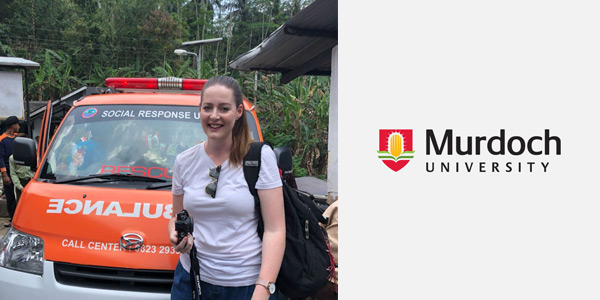Alicia Stafford is a New Colombo Plan mobility grant recipient from Murdoch University. Alicia undertook the Development Studies Immersion Program at Gadjah Mada University in Semester 1, 2018.
Q: Why did you decide to undertake ACICIS’ Development Studies Immersion Program?
I decided to do the program because it seemed like an amazing opportunity to be able to put what I’d learned so far during my degree into practice whilst getting to live in another country. Win-win really!
Q: What classes/units are you currently enrolled in?
As a DSIP student, I completed six weeks of intensive language classes at UGM and for the last two months I completed an internship with Arbeiter-Samariter-Bund Indonesia & The Philippines.
Q: Are you involved in any clubs/societies at the university?
I haven’t had a lot of time to participate in clubs or societies, but there are options for pretty much any interest you might have. That said, just socialising with friends, both Australian and Indonesian, is a great way to spend your time!
Q: How will the Development Studies Immersion Program influence your future career or study?
I’ve been lucky enough to work with an amazing organisation that specialises in disability-inclusive disaster risk reduction and the experience and skills I’ve gained have been invaluable. My time with ASB has given me some excellent knowledge around what true inclusion looks like, and I know that when I graduate and go out into the world of International Development, the time I spent with and lessons learned from ASB will make me an inclusive practitioner.
Q: How does development in Indonesia differ to what you’ve seen before?
Development in Indonesia doesn’t differ too much to what I’ve seen in other countries I’ve visited. I think as Australians we very much take it for granted that our government provides a societal safety net (although this obviously isn’t without its issues or failures) and it can be hard to understand sometimes how government doesn’t intervene in issues that seem so obviously in need of policy intervention. That said, I have undying admiration for Indonesians, like my colleagues here at ASB, who continue to fight the good fight every day and work hard to push for policy, especially policy that impacts on the most vulnerable members of society.
Q: What do you like to do in your spare time in Yogyakarta?
Eat and explore! Yogyakarta is such an amazing city and I will definitely be leaving a part of my heart here when I go. There is also an amazing arts scene here and if you’re lucky enough to be in Yogya during ARTJOG, make sure you go to as many events and exhibitions as possible.
Q: Are you undertaking an internship while in Indonesia?
Yes, I’ve interned with a German NGO, Arbeiter-Samariter-Bund, while I’ve been here in Yogyakarta. They focus on disability-inclusive disaster risk reduction and have a wide range of activities throughout Indonesia and The Philippines. I’ve been able to participate in a lot of different activities while working with them – everything from observing a community-wide landslide simulation, translation activities, helping to put together program documents, to leading an Earthquake training session at Yogyakarta International School. My time with them has been amazing.
Q: What is your favourite Indonesian food and favourite place to eat?
This is a tough one! I love so many Indonesian dishes but I have a real soft spot for Tongseng and Rendang although it really depends on my mood. Some of my must-eat places are Waroeng SS (get the tempeh sambal and if you’re a meat eater, the Sapi Goreng), Sambal Korek Pak Topo (amazing chicken), Lotek & Gado Gado Jambusari, and Sate Padang Asli on Jl. Kaliurang. The Mie Ayam and the Pecel Telor from the Fakultas Ilmu Budaya Canteen are both favourites among a lot of us DSIP students too! For dessert, Tempo Gelato is great and I’d also recommend the Roti Caramel from Rempah Asia.
Q: Favourite Indonesian word/phrase?
For usefulness it would be “Tanpa gula” (without sugar – this comes in VERY handy), but there are so many others that I love. Polisi tidur is a favourite of mine – it’s used to describe speed bumps but literally translates to “Sleeping policeman”. I also love Kaos Kaki which is the Indonesian word for sock because when translated it essentially means foot shirt!
Q: What places in Indonesia have you visited during your semester so far?
I’ve mainly travelled to places in Central Java that are quite close to Yogyakarta so far but I’m hoping to see a lot more of this beautiful country in the future.


